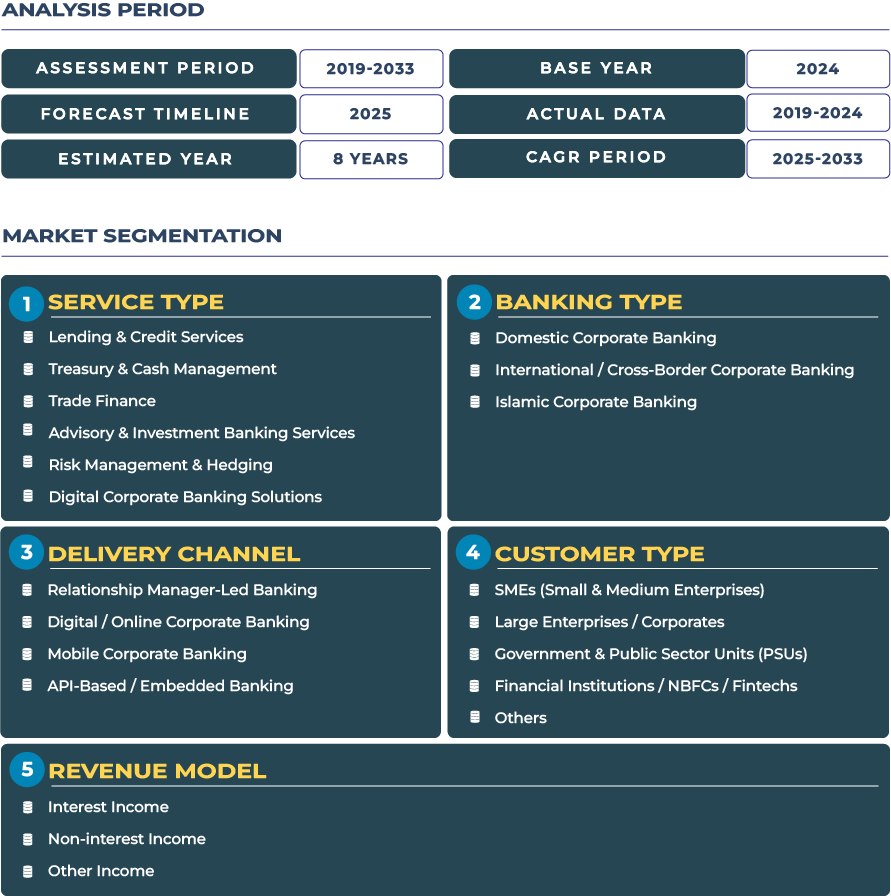Argentina Corporate Banking Market Outlook: Digital Evolution Empowering SMEs Amid Economic Complexity
Argentina corporate banking market is undergoing a measured yet strategic transformation, anchored in the digital expansion of SME banking solutions. With the domestic economy facing structural inflationary challenges and evolving foreign exchange constraints, leading financial institutions are prioritizing fintech partnerships and digital platforms to improve accessibility for small and medium enterprises (SMEs). In 2025, the Argentina corporate banking market is estimated at USD 18.3 billion and projected to reach USD 20.2 billion by 2033, growing at a CAGR of 1.2% during 2025–2033, according to DataCube Research.
Note:* The market size refers to the total revenue generated by banks through interest income, non-interest income, and other ancillary sources.
Banks are developing end-to-end cash management and trade finance ecosystems that leverage AI-enabled transaction monitoring, predictive liquidity management, and digital onboarding. Fintech-driven digital lending platforms are filling a critical financing gap for SMEs, who remain underserved by traditional credit lines. Moreover, the growing adoption of real-time treasury management tools and foreign exchange (FX) hedging solutions reflects the increasing sophistication of corporate clients.
The Central Bank of Argentina (BCRA) is playing a vital role by promoting financial inclusion and improving digital payment infrastructure, setting a foundation for fintech integration within the formal banking ecosystem. As a result, the country corporate banking landscape is gradually shifting toward a digital-first approach aimed at improving liquidity management, payment automation, and trade connectivity.
Drivers & Restraints: Balancing Export Finance Demand with Inflationary Pressures
Argentina corporate banking industry is being shaped by its export-oriented economy, where agribusiness, energy, and commodities dominate corporate credit demand. One of the key drivers is the robust need for foreign exchange and commodity financing among exporters. With agribusiness remaining a pillar of Argentina’s economy, corporate banks are providing tailored trade finance products and structured commodity-backed loans that enhance liquidity during export cycles. Additionally, large enterprises are increasingly turning to hedging and offshore treasury services to manage currency volatility and inflation exposure.
Another major growth enabler is the rising need for digital treasury solutions among multinational corporations operating in Argentina. These firms are integrating enterprise resource planning (ERP) and digital banking interfaces to optimize multi-currency transactions and real-time cash visibility. However, the market’s progress is constrained by several macroeconomic factors. Persistent high inflation, political uncertainty, and capital controls continue to impact liquidity and lending appetite.
Moreover, limited access to correspondent banking networks for USD transactions poses additional challenges to cross-border trade. The frequent changes in foreign exchange regulations, combined with stringent capital flow restrictions, hinder long-term investment strategies for corporate clients. Despite these challenges, the market’s resilience lies in its adaptability, financial institutions are localizing strategies to manage regulatory risks while leveraging digital ecosystems to expand SME coverage.
Trends & Opportunities: From Commodity Finance to Indexed Corporate Lending
A defining trend in the Argentina corporate banking sector is the expansion of pre-export commodity financing, particularly within the soy, corn, and lithium export sectors. Corporate banks are increasingly offering structured credit facilities linked to export receivables, enabling exporters to access working capital in advance of shipment cycles. Simultaneously, offshore treasury and FX hedging services are becoming essential tools for multinationals to navigate currency instability while maintaining operational liquidity.
Another emerging trend is the adoption of local currency-indexed lending, a mechanism that mitigates inflationary risks for corporates while allowing banks to align loan valuations with real purchasing power. The integration of blockchain-based trade documentation systems in Buenos Aires and Córdoba has further enhanced transparency and reduced transaction times in trade finance. These initiatives underscore the growing intersection between traditional banking institutions and fintech disruptors in Argentina’s financial ecosystem.
Opportunities abound in expanding index-linked corporate loans and increasing the use of offshore treasury accounts to manage FX exposure. Furthermore, as Argentina continues to advance its digital payment infrastructure through government-backed initiatives like Argentina’s Ministry of Economy’s fintech roadmap, corporate banks are well-positioned to leverage open banking APIs for enhanced data-driven services. The adoption of data analytics and intelligent credit scoring models also offers significant potential for SME-focused corporate banking solutions.
Competitive Landscape: Local Banks Reinventing Corporate Solutions Through Digital Ecosystems
Argentina corporate banking ecosystem features strong participation from domestic leaders such as Banco Galicia, Banco Macro, and Banco de la Nación Argentina, alongside international players like Santander Argentina and BBVA. These institutions are investing heavily in digital infrastructure, fintech partnerships, and ESG-linked corporate financing. For instance, Banco Galicia has expanded its pre-export financing solutions targeting agribusiness clients, while Santander Argentina launched an integrated digital treasury platform for corporate clients in 2024 to streamline real-time FX and cash management.
Corporate banks are also bundling ESG-linked loan products and sustainability-tied credit lines as global corporates demand green financing mechanisms aligned with carbon reduction strategies. With rising pressure to digitize trade documentation, Argentine banks are integrating electronic invoicing and smart contract technologies to reduce credit risk and improve compliance. The competitive environment is increasingly defined by how banks balance inflation resilience with innovation agility, aiming to strengthen client retention and corporate trust amid market uncertainty.







